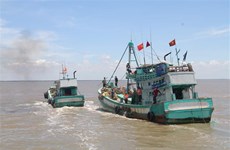Steel fishing vessels encourage fishermen to head to sea
Fishermen in some coastal provinces have recently been provided with
loans to build steel-hulled boats. Steel shells with high load
capacity not only ensure safety for fishermen at sea and help increase
productivity and quality of fishing activities, but also encourage
fishermen to head their vessels to traditional fishing grounds, firmly
asserting and protecting Vietnam’s sovereignty over its seas and
islands, according to online Nhan Dan newspaper.
Fishermen in some coastal provinces have recently been provided with
loans to build steel-hulled boats. Steel shells with high load
capacity not only ensure safety for fishermen at sea and help increase
productivity and quality of fishing activities, but also encourage
fishermen to head their vessels to traditional fishing grounds, firmly
asserting and protecting Vietnam’s sovereignty over its seas and
islands, according to online Nhan Dan newspaper.
In a sweltering afternoon, fishing boats of fishermen in Tam Quan Bac commune, Hoai Nhon district (Binh Dinh province), bringing loads of tuna, queued up to dock after their long offshore fishing journeys.
Wiping the sweat from his tanned face, fisherman Nguyen Van Minh, owner of BD-95270 vessel, urged his crew to unload fish for the warehouse and said: “It becomes harder nowadays for fishing activities with harsh weather, erratic rains and storms, varied catches and uncertain prices. I'm very glad to hear that the State has offered loans to fishermen to build steel shells. Steel-hulled ships are more durable and safer for long voyages, and surely productivity will be much higher thanks to the application of new technologies.”
Vietnam possesses huge marine advantages, with a coastline of over 3,000 km and an exclusive economic zone of over one million square kilometres, yet offshore fishing is still poorly developed and mainly operated on manpower.
Of more than 130,000 fishing boats operating across the nation, up to 99 percent of them are wood hull ships with small capacity, short sailing times, vulnerable to collisions and lacking good seafood preservation technologies. Thus, the Government’s 16 trillion VND (752 million USD) credit package pouring into the fishing industry, paving the way to replace 3,000 wood-hulled vessels with steel ones, has received positive response from the society.
This will be an important boost to shift the sector to a modern focus with high-tech applications. It is expected to support fishermen to develop production and facilitate the marine economy, as well as contributing to protecting national sovereignty over seas and islands.
Business Director Pham Binh Minh at Shipbuilding Industry Corporation (SBIC) said that in comparison with wooden-hulled ships, steel was more durable. They are styled to achieve optimum operation, allowing them to travel at higher speed while making them fuel efficient.
The hulls are divided into separate watertight compartments, allowing the ships to bring more resources, fuel and fresh water. Standard freezer chambers in the ships help preserve seafood. Steel-hulled ships are capable of withstanding winds up to Force 9 on the Beaufort scale, while wooden ships can only endure wind speeds of Force 6-7. According to calculations, the cost for a steel ship is 50-60 percent higher than but steel-hulled ships bring long-term economic benefits.
Steel hull ships have many advantages; however, fishermen still have many concerns.
Fishermen Bui Thanh Ninh in Thien Chanh 2 hamlet, (Tam Quan Bac commune) wondered: "Prior to now, we only use our traditional experiences to catch fish. Now, with steel-hulled ships and a range of new technologies, it will take time for us to get familiar with these advances. Importantly, how and where we can send steel-hulled ships for maintenance?”
In response to this, Director Le Quang Lam of Nha Trang Shipbuilding Co., Ltd said that to build a ship that matches fishermen's requirements and fishing traditions, the company regularly consulted fishermen from each step of design and construction processes for timely adjustments.
Ship owners can join and oversee the shipbuilding processes, right from the first step, to understand the basic features of the ship. In particular, fishermen can also source and order engines and other machinery for their ships, ensuring they have all necessary certification.
Then the trial run for the ship is also a training course, providing future ship owners with detailed instructions on handling techniques, fishing, and coping with and repairing simple failures.
Regarding maintenance, ships built by SBIC will be given a one-year factory warranty. All other steel fishing vessels can be sent to any plant of 18 units under the SBIC across the nation for maintenance and repair.
An offshore fishing programme launched by the Government in 1997 placed the very first foundation to encourage fishermen nationwide to go offshore fishing.
Fisherman Phan Trong Nghiep in Hoai Huong commune, Hoai Nhon district of Binh Dinh province said: “Previously, Binh Dinh fishermen mainly conducted inshore fishing. Once heading to the sea, we could only go as long as 5-10 hours. Thanks to timely support from the programme, the offshore fishing movement of Binh Dinh fishermen has been widely developed. Now, each fishing trip lasts more than 20 days, reaching as far as 120 nautical miles.”
With such experiences in deploying the programme, a range of fisheries development policies to be issued in the future demonstrate the Party and State’s attention to assisting fishermen in increasing catching yields, enhancing economic efficiency, and creating confidence for fishermen when going offshore and maintaining national maritime sovereignty.
In fact, capital for steel ship building is still large compared to the ability of most fishermen to afford them, requiring more preferential policies to support them.
Fisherman Le Ngoc Son in Quang Phu commune, Quang Trach district (Quang Binh province) said: “If the Government could exempt the value-added tax for loans from the package, it would be enough for us to invest in additional equipment for our new ships.”
In order to effectively implement the package, in addition to removing obstacles in credit mechanisms, it is necessary to apply different timely solutions to support fishermen, including building steel ships that are designed to suit each fishing purpose and fishermen's capacity.
SBIC Chairman Nguyen Ngoc Su said that SBIC has prepared 10 models of steel-hulled vessels in the most appropriate design for different fishing sectors and they are continuously improved. SBIC also plans to design various ship models to suit the customs of each region. The corporation can immediately engage in mass production of such shipbuilding models, once appropriate mechanisms are issued.
Due to a reduction in costs from design to material procurement, steel-hulled ship prices will be much lower. In addition, a number of devices such as propellers and anchor winches can be produced by units under the SBIC, helping lower the costs and raising the localisation rate of steel-hulled ship production.
Offshore fishing vessels when on journey should operate in groups and teams to support each other and raise fishing efficiency. Each locality should develop plans and allocate budgets for developing ports and logistics and widening waterways.
It is also important to encourage the building of logistical vessels supplying necessities and purchasing products from offshore fishing boats, to facilitate fishermen during long journeys.
In a sweltering afternoon, fishing boats of fishermen in Tam Quan Bac commune, Hoai Nhon district (Binh Dinh province), bringing loads of tuna, queued up to dock after their long offshore fishing journeys.
Wiping the sweat from his tanned face, fisherman Nguyen Van Minh, owner of BD-95270 vessel, urged his crew to unload fish for the warehouse and said: “It becomes harder nowadays for fishing activities with harsh weather, erratic rains and storms, varied catches and uncertain prices. I'm very glad to hear that the State has offered loans to fishermen to build steel shells. Steel-hulled ships are more durable and safer for long voyages, and surely productivity will be much higher thanks to the application of new technologies.”
Vietnam possesses huge marine advantages, with a coastline of over 3,000 km and an exclusive economic zone of over one million square kilometres, yet offshore fishing is still poorly developed and mainly operated on manpower.
Of more than 130,000 fishing boats operating across the nation, up to 99 percent of them are wood hull ships with small capacity, short sailing times, vulnerable to collisions and lacking good seafood preservation technologies. Thus, the Government’s 16 trillion VND (752 million USD) credit package pouring into the fishing industry, paving the way to replace 3,000 wood-hulled vessels with steel ones, has received positive response from the society.
This will be an important boost to shift the sector to a modern focus with high-tech applications. It is expected to support fishermen to develop production and facilitate the marine economy, as well as contributing to protecting national sovereignty over seas and islands.
Business Director Pham Binh Minh at Shipbuilding Industry Corporation (SBIC) said that in comparison with wooden-hulled ships, steel was more durable. They are styled to achieve optimum operation, allowing them to travel at higher speed while making them fuel efficient.
The hulls are divided into separate watertight compartments, allowing the ships to bring more resources, fuel and fresh water. Standard freezer chambers in the ships help preserve seafood. Steel-hulled ships are capable of withstanding winds up to Force 9 on the Beaufort scale, while wooden ships can only endure wind speeds of Force 6-7. According to calculations, the cost for a steel ship is 50-60 percent higher than but steel-hulled ships bring long-term economic benefits.
Steel hull ships have many advantages; however, fishermen still have many concerns.
Fishermen Bui Thanh Ninh in Thien Chanh 2 hamlet, (Tam Quan Bac commune) wondered: "Prior to now, we only use our traditional experiences to catch fish. Now, with steel-hulled ships and a range of new technologies, it will take time for us to get familiar with these advances. Importantly, how and where we can send steel-hulled ships for maintenance?”
In response to this, Director Le Quang Lam of Nha Trang Shipbuilding Co., Ltd said that to build a ship that matches fishermen's requirements and fishing traditions, the company regularly consulted fishermen from each step of design and construction processes for timely adjustments.
Ship owners can join and oversee the shipbuilding processes, right from the first step, to understand the basic features of the ship. In particular, fishermen can also source and order engines and other machinery for their ships, ensuring they have all necessary certification.
Then the trial run for the ship is also a training course, providing future ship owners with detailed instructions on handling techniques, fishing, and coping with and repairing simple failures.
Regarding maintenance, ships built by SBIC will be given a one-year factory warranty. All other steel fishing vessels can be sent to any plant of 18 units under the SBIC across the nation for maintenance and repair.
An offshore fishing programme launched by the Government in 1997 placed the very first foundation to encourage fishermen nationwide to go offshore fishing.
Fisherman Phan Trong Nghiep in Hoai Huong commune, Hoai Nhon district of Binh Dinh province said: “Previously, Binh Dinh fishermen mainly conducted inshore fishing. Once heading to the sea, we could only go as long as 5-10 hours. Thanks to timely support from the programme, the offshore fishing movement of Binh Dinh fishermen has been widely developed. Now, each fishing trip lasts more than 20 days, reaching as far as 120 nautical miles.”
With such experiences in deploying the programme, a range of fisheries development policies to be issued in the future demonstrate the Party and State’s attention to assisting fishermen in increasing catching yields, enhancing economic efficiency, and creating confidence for fishermen when going offshore and maintaining national maritime sovereignty.
In fact, capital for steel ship building is still large compared to the ability of most fishermen to afford them, requiring more preferential policies to support them.
Fisherman Le Ngoc Son in Quang Phu commune, Quang Trach district (Quang Binh province) said: “If the Government could exempt the value-added tax for loans from the package, it would be enough for us to invest in additional equipment for our new ships.”
In order to effectively implement the package, in addition to removing obstacles in credit mechanisms, it is necessary to apply different timely solutions to support fishermen, including building steel ships that are designed to suit each fishing purpose and fishermen's capacity.
SBIC Chairman Nguyen Ngoc Su said that SBIC has prepared 10 models of steel-hulled vessels in the most appropriate design for different fishing sectors and they are continuously improved. SBIC also plans to design various ship models to suit the customs of each region. The corporation can immediately engage in mass production of such shipbuilding models, once appropriate mechanisms are issued.
Due to a reduction in costs from design to material procurement, steel-hulled ship prices will be much lower. In addition, a number of devices such as propellers and anchor winches can be produced by units under the SBIC, helping lower the costs and raising the localisation rate of steel-hulled ship production.
Offshore fishing vessels when on journey should operate in groups and teams to support each other and raise fishing efficiency. Each locality should develop plans and allocate budgets for developing ports and logistics and widening waterways.
It is also important to encourage the building of logistical vessels supplying necessities and purchasing products from offshore fishing boats, to facilitate fishermen during long journeys.













